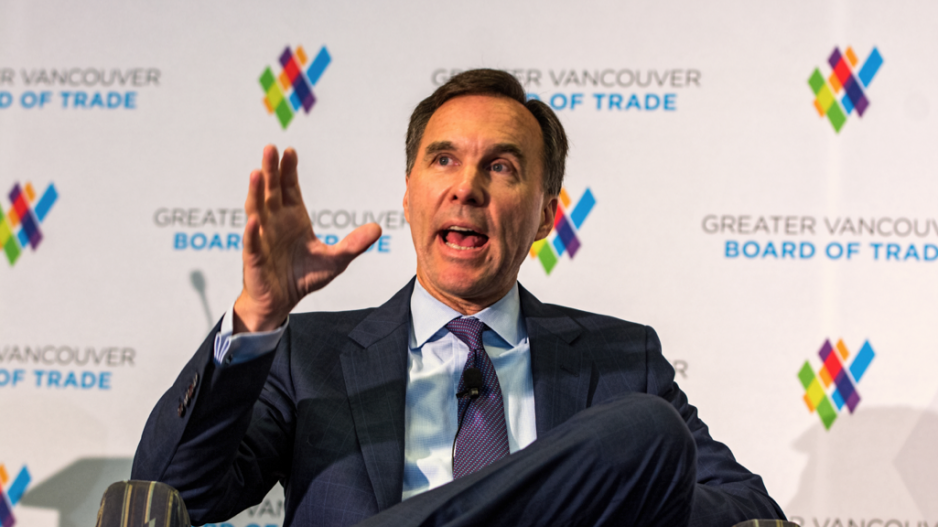Despite Ottawa’s assurances that the new United States-Mexico-Canada Agreement (USMCA) does not change the country’s position on pursuing trade opportunities with China, observers say the deal’s non-market economies clause is a game-changer that could fragment the global trade system.
The USMCA’s Article 32.10 states that any one of the three USMCA partners must inform the other two in advance about starting free-trade negotiations with a non-market economy and that the other partners can terminate the USMCA if those negotiations result in a free-trade agreement. That requirement is unprecedented in global trade negotiations because it gives Washington veto power over Canada if the latter pursues free trade with China.
China is one of only a handful of countries the World Trade Organization lists as non-market economies. Vietnam, North Korea and Mongolia are also on the list.
While speaking to the Greater Vancouver Board of Trade on October 2, federal Finance Minister Bill Morneau downplayed the clause’s impact.
He noted that the United States – like Canada and Mexico – had the right to back out of the North American Free Trade Agreement (NAFTA) at any time. Thus, the addition of a non-market economy clause, he said, simply adds a reason for a USMCA partner to pull out and does not “materially” change the nature of the agreement or Canada’s trade policy.
“We’re always going to have – as we have today – the U.S. as our largest trading partner,” Morneau said. “That will always create sensitivities about what other things we do around the world. If your largest client is Telus, and you are about to sign a deal with Bell Canada, you might think about that and make sure they are OK with it.”
Morneau added that the USMCA would also not change Canada’s future focus on further investment in Vancouver as the country’s Asia-Pacific Gateway, which is estimated to employ about 250,000 people – 10% of the province’s jobs – and contribute $27.5 billion to the provincial GDP.
“There’s obviously an important issue in the Unites States’ context where they are working to change the trade relationship with the Untied States and China,” Morneau said. “They are trying to make sure the openness to the Chinese economy to American investment is more reciprocal.… They wanted to make sure that, as we have this agreement, that we weren’t in any way creating a back door for other economies to come through Canada into the North American market.”
But some analysts and academics disagree.
Yves Tiberghien, director emeritus of the University of British Columbia’s Institute of Asian Research and executive director of the school’s China Council, said the inclusion of the clause caught him off guard.
“At first glance, it’s hard to believe that Canada would accept that, because it’s a constraint on sovereignty and autonomy – especially when you essentially let your No. 1 trade partner decide about your No. 2 trade partner.… The reality is the U.S. has the power to do what it wants.”
Tiberghien said that while Canada has little choice but to accept a “poison-pill” clause in the USMCA, how Asian and European countries react to similar clauses in discussions with Washington will determine whether the current World Trade Organization-centred global trade order survives the next decade.
Currently, 76% of Canada’s exports (US$320 billion) go to the United States and 4.3% (US$18.2 billion) go to China – Canada’s second-largest trade partner.
“The Canadian negotiators probably said to themselves that, on a trade deal with China, they would inform the U.S. normally, since they are our core partner, so it’s not that different then before,” Tiberghien said. “But it is still different because it’s now a legal requirement that introduces a tripwire for the U.S. to veto such a deal.”
Sean King, former American diplomat and current senior vice-president of New York-based consultancy Park Strategies, cautioned that Canadians should not be too worried about the supposed veto power Washington might hold over Ottawa. He noted given that Canada’s effort to get a free-trade agreement with China had already stalled late last year due to a difference in values that resulted in Beijing rejecting Prime Minister Justin Trudeau’s plan to seek additions like new labour and environmental standards into any Canada-China trade agreement.
“Before anyone gets too crazy over NAFTA 2.0 … let’s not forget that Ottawa’s Beijing trade efforts were already going nowhere fast,” he said. “As I remember it, [Chinese President] Xi Jinping wasn’t on board with Prime Minister Trudeau’s progressive trade agenda.”
King did add, however, that he expects American negotiators to implement – or at least try to implement – similar veto powers in future free-trade negotiations with the likes of Japan and the European Union. He said that the former may agree to the provision if the Trump administration ever comes around on its participation in the Comprehensive and Progressive Agreement for Trans-Pacific Partnership (of which Japan and Canada are both members).
Tiberghien disagreed.
He noted that Tokyo has shown “remarkable pragmatism” in the face of the United States’ hardening position on China on trade. He said key Asian economies like Japan, South Korea and Taiwan all have a significant stake in keeping the current trade order going, given that all have more exports into the Chinese market than they do into the American market. •




